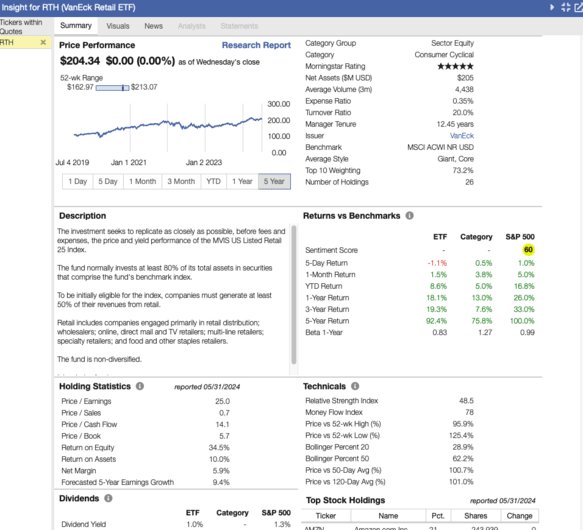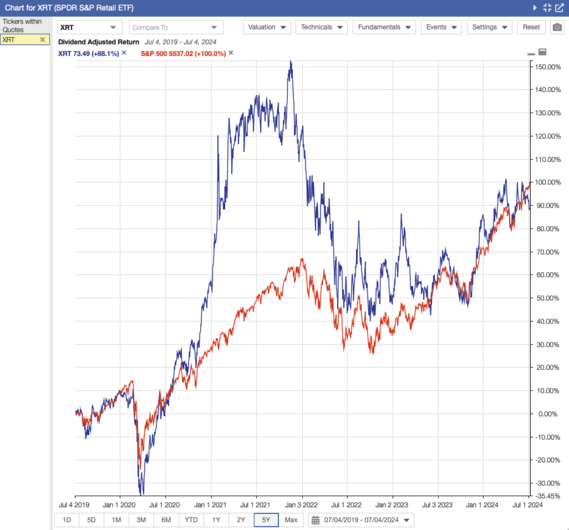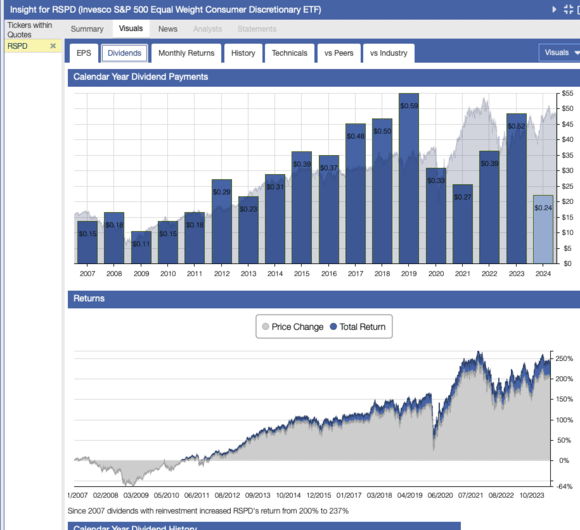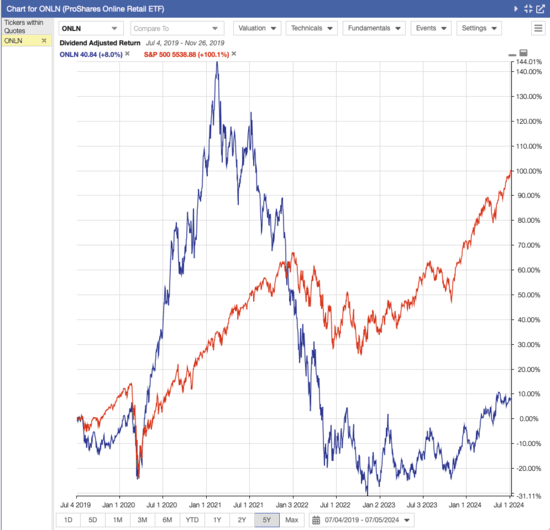The retail sector is immense and contains nearly everything that can be bought or sold. Thanks to humanity’s need to use “stuff,” retail is not going away soon. Because of the vast nature of retail, discovering which securities to invest in can be a daunting task. Fortunately, retail exchange-traded funds (ETFs) exist to help alleviate the issue. Each fund contains several stocks from the industry, offering the chance to pick up multiple stocks for one price. But what are the best retail ETFs for an investor?
Retail sales continue to see 5% growth on average year after year, and e-commerce crossed the $1.1 trillion mark in 2023. It is estimated online retail sales total about 15.9% of all retail sales in first quarter of 2024. This growth makes it a solid investment opportunity for anyone interested in the long term. Considering the size of the retail industry, investors should have some exposure to it. However, it is hard to pick winners and losers in retail. An investor may want to try ETFs instead of stocks.
This article showcases some of the most popular retail ETFs currently available.
Affiliate
Stock Rover is an award winning investment research platform.
- The site has 8,500+ stocks, 4,000 ETFs, and 40,000 mutual funds.
- Access to 650+ metrics, financial data, market news, stock and fund ratings, fair value, margin of safety, etc.
- Includes brokerage integration, portfolio tracking, rebalancing, watchlists, alerts, future income forecasts, etc.
Click here to try Stock Rover for free (14-day free trial).
Best Retail Sector ETFs to Buy Now
VanEck Vectors Retail ETF (NASDAQ: RTH)
VanEck Vectors Retail ETF (RTH) is one of a handful of retail industry ETFs looking to continue a trend of upward momentum on the stock market. It mirrors the MVIS US Listed Retail 25 Index, containing a nearly identical list of 25 retail stocks. Holdings include everything from home improvement to warehouse clubs, automotive retailers, department stores, and discount stores.
Each of the companies in this VanEck fund are brick and mortar retailers, but some stand out for their online exposure. Top investments are Amazon (AMZN) at 20.58%, Costco Wholesale (COST) at 9.27%, and Walmart (WMT) at 7.99%. The expense ratio is a reasonable 0.35%.
This 100% stock fund showcases retail companies found almost entirely within the United States. Only 2.71% of businesses reside in China. Nearly 60% of these companies fall into the consumer discretionary space, with 29% dipping into consumer staples and another 12.6% in healthcare. Assets under management (AUM) totaled over $208 million, making it a smaller fund.
According to StockRover*, Investors will be happy to hear that the fund has a 19.3% rate of return for the last three years, indicating solid past performance. Shares currently sell for around $205, significantly less than a single share from Amazon. In addition, the ETF pays out a 0.98% dividend yield.

SPDR S&P Retail ETF (NYSE: XRT)
The SPDR S&P Retail ETF (XRT) is a well-diversified exchange-traded fund created to follow the S&P Retail Select Industry Index as its underlying index. It holds 78 stocks, offering broad exposure to the retail industry.
Investors looking for a vast portfolio will be pleased to learn that XRT weights its assets reasonably equally, with no retailer exceeding 2% of the asset pool. Top companies include Caravana (CVNA) at 1.7%, Ollie’s Bargain Outlet Holdings (OLLI) at 1.52%, and Sprouts Farmers Market (SFM) settling in at 1.50%. If you’re looking at investing, expect to pay 0.35% for expense ratio fees.
Holdings cover several industries, with nearly 22% going to automotive retail. Apparel retail make up another 21%, with the remainder trickling down into areas like breadline retail, food retail, and consumer staples. Total AUM reaches upwards of $312 million.
Unlike VanEck, the SPDR ETF saw a -20.4% return over the last three years. The fund is more volatile than the S&P 500 Index. Investing shouldn’t break the bank at roughly $73 per share. While waiting for shares to trend upward, you’ll still enjoy a 1.39% dividend yield according to StockRover*.

Invesco S&P 500 Equal Weight Consumer Discretionary ETF (NYSE: RSPD)
The Invesco S&P 500 Equal Weight Consumer Discretionary ETF (RSPD) is based on the S&P 500 Equal Weight Consumer Discretionary Index. The ETF invests at least 90% of its assets into retail stocks that make up the index.
Asset weight is pretty evenly distributed among 54 securities in the retail industry. The ETF shies away from a specific industry, covering companies across multiple industries. Top holdings include Tesla (TSLA) at 2.68%, Carnival (CCL) at 2.20%, and Ford Motor (F) at 2.13%.
Total assets under management eclipse the $362 million mark across all companies. Most fall into the mid to large-cap range, offering more overall stability. Those looking to invest in this ETF must overcome a reasonable 0.40% expense ratio.
Over the last three years, RCD has dropped -2.7%. Unfortunately, this number includes a period of time when retail stocks have performed poorly. The shares are trading at over $47 at the moment after 3-to-1 split in July 2023. The ETF also pays out a dividend yield of 1.0% according to StockRover*

Top Online Retail ETFs (E-commerce)
ProShares Online Retail ETF (NYSE: ONLN)
ProShares Online Retail ETF (ONLN) contains 18 exclusively online retailers that capitalize on the nearly four billion individuals now shopping over the internet. Holdings come from the ProShares Online Retail Index, which looks at companies selling through non-store methods. 72% of companies are based in the United States, with most of the remainder in China and South Korea.
A few companies reign supreme within the fund, while other stocks carry significantly less weight. Those at the pinnacle include Amazon (AMZN) at 25.06%, PDD Holdings (PDD) at 9.87%, and eBay (EBAY) at 9.02%. The expense ratio for this ETF is 0.58%.
Total assets under management reach into the $100 million range, and a quarter of that is directly from Amazon. All stocks represent online retailers that focus on consumer spending. Investors looking to add a retail industry ETF to their index portfolio that hinges on online marketplaces should look no further.
Current share prices are close to $41, following a downward slide over the last three years. Access to online sales giants at this price point could make for a worthwhile investment. The ETF has still seen a -48.2% loss over the last three years according to StockRover*.

Amplify Online Retail ETF (NYSE: IBUY)
The Amplify Online Retail ETF (IBUY) corresponds to the EQM Online Retail Index. This index owns 77 stocks that must get at least 70% revenue from the online sector, not brick-and-mortar stores. In addition, 81% of these stocks come from the United States, with the remaining 19% representing other countries.
Nearly three-quarters of the holdings in Amplify’s ETF fall into the conventional online retail and marketplace space, with 16% specific to the omni channel retail. The remaining 12% of stocks in this portfolio fall into the travel sector. No single stock carries much weight, with the highest barely capping 3.9% of total volume. As far as expense ratios go, IBUY’s is higher than other retail ETFs at 0.65%.
Hims & Hers Health (HIMS) sits in the top spot at 3.86%, with Chewy (CHWY) following up at 3.78%, and Caravan (CVNA) at 2.87%. Total assets surpass the $175 million mark according to StockRover*.
This fund has lost -57.4% over the last three years, revealing the challenges of the retail industry. However, shares cost close to the $55 mark after seeing some volatility over the previous few years.

Global X E-commerce ETF (NASDAQ: EBIZ)
The Global X E-Commerce ETF (EBIZ) models the Solactive E-commerce Index. It focuses on businesses capitalizing on e-commerce platforms and software and selling goods and services online. The fund features a total of 40 unique holdings.
No single stock has the lion’s share of weight in the ETF, with Carvana (CVNA) in the top spot at 10.21%. The automotive site is followed by Sea LTD-ADR (SE) at 6.81% and Williams-Sonoma (WSM) at 4.71%, respectively. Its expense ratio sits right at 0.50%.
Share distribution is most heavily in the consumer discretionary space, representing nearly 67% of the fund. This percentage is complemented by information technology and communications, making up 22.5% of what remains. The United States carries 51.7% of the ETF’s stocks, with China coming in a distant second at 21.3%.
Trading at $24 per share, Global X’s ETF is the most cost-effective fund on this list. EBIZ is down -29.2% over the last three years according to StockRover*. Although not high, the fund pays out a dividend yield of around 0.50% to further sweeten the pot.

Why Invest in Retail ETFs?
People continue buying products out of necessity and convenience, whether in brick-and-mortar stores or online. Because of this, the retail industry isn’t going anywhere. Big-box stores like Walmart (WMT) and online retail companies like Amazon continue to grow.
Exchange-traded funds from this sector are an excellent way for investors to get broad exposure to stocks from the retail industry. In theory, a sector or industry ETF is an easy way to manage multiple stocks, as they all fall under one umbrella. Similarly, if one stock in the fund flounders, others should help keep the ETF from significantly declining.
Where a single share of Amazon would set you back over $3,000, these funds make it easy to invest in these big names without breaking the bank. Investing in the most expensive ETF on this list will only set you back at just over $100 per share.
Where to Buy Retail ETFs
Retail ETFs are commonly listed on major exchanges like NASDAQ or the New York Stock Exchange (NYSE). As a result, it’s easy to invest in these funds through any brokerage that trades on either market.
Affiliate
Stock Rover is an award winning investment research platform.
- The site has 8,500+ stocks, 4,000 ETFs, and 40,000 mutual funds.
- Access to 650+ metrics, financial data, market news, stock and fund ratings, fair value, margin of safety, etc.
- Includes brokerage integration, portfolio tracking, rebalancing, watchlists, alerts, future income forecasts, etc.
- Plus export to spreadsheets, dividend calendar, 10+ years of data history, etc.
- Best Buy and Hold Screener by Investopedia
- Editor’s Choice by American Association of Individual Investors (AAII).
Click here to try Stock Rover for free (14-day free trial).
Best Retail ETFs: Final Thoughts
The retail industry has been around for an extremely long time and will continue to be so long as people need to buy products to live. Moreover, the past indicates that retail stocks can come out the other side stronger than before, even in times of economic crisis or bear markets.
Retail ETFs are a great way to plug into the sector without juggling individual stocks from several industries. They can also provide a means to snag a piece of lucrative companies such as Amazon, Booking, and AutoZone that would typically set you back a couple of thousand dollars per share.
Disclosure: The author has no ties to or holdings in any of the securities listed above
Whether a new trader or an experienced guru, ETFs are often lower-risk investments that fit well into any portfolio looking for long-term slow growth.
Related Articles on Dividend Power
Here are my recommendations:
Affiliates
- Simply Investing Report & Analysis Platform or the Course can teach you how to invest in stocks. Try it free for 14 days.
- Free Dividend Kings Spreadsheet from Sure Dividend, complete with Buy/Hold/Sell recommendations, dividend histories, and much more. It is an excellent resource for DIY dividend growth investors and retirees.
- Stock Rover is the leading investment research platform with all the fundamental metrics, screens, and analysis tools you need. Try it free for 14 days.
- Portfolio Insight is the newest and most complete portfolio management tool with built-in stock screeners. Try it free for 14 days.
Receive a free e-book, “Become a Better Investor: 5 Fundamental Metrics to Know!” Join thousands of other readers !
*This post contains affiliate links meaning that I earn a commission for any purchases that you make at the Affiliates website through these links. This will not incur additional costs for you. Please read my disclosure for more information.
Noah Zelvis is an American copywriter for The Stock Dork who is on a mission to help clarify the nuances of the financial world. With a background in tech design, Noah is no stranger to numbers and financial data. He now uses these powers for good by writing reviews for The Stock Dork. When he’s not working, you’ll likely find Noah out running or traveling.
